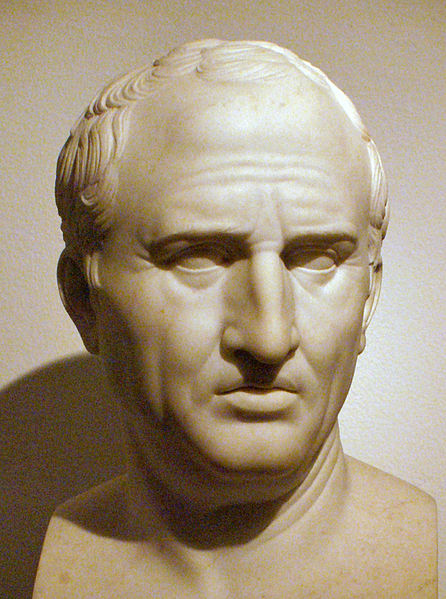
Now to attend Paradox IV – That every fool is a madman. This one’s only two pages long! However Mark Webb in his CICERO’S PARADOXA STOICORUM:A NEW TRANSLATION WITH PHILOSOPHICAL COMMENTARY for this paradox he says:
‘There is a substantial lacuna in the text here, after which the title paradox, that every fool is insane, is abandoned and two other paradoxes are taken up. They have been identified by Molager and Lee as “Every fool is an exile” and “The wise man cannot be harmed.” Very probably the end of paradox four and the beginning of the other has dropped out.’
The mind of a wise man in the face of exile
So with a gap in the existent text it is all the more harder to understand the context. So now we entertain the rest of this two page text, beginning with this paradox opening up with Cicero right off the bat calling the reader (Brutus) ‘insane and mad’ which he further disapproves of further in the text (who else could it have been?) Anyway after that Cicero changes his tone and goes on to say:
“Could the mind of the wise man, fortified as with walls by depth of counsel, by patient endurance of human ills, by contempt of fortune; in short, by all the virtues – a mind that could not be expelled out of this community – shall such a mind be overpowered and taken by storm?”
Cicero is here talking about himself by the way. As a man that braced himself for the troubles to come his way.
What makes a community?
“For what do we call a community? Surely, not every assembly of thieves and ruffians? Is it then the entire rabble of outlaws and robbers assembled in one place? No; you will doubtless reply. Then this was no community when its laws had no force; when its courts of justice were prostrated; when the customs of the country had fallen into contempt; when, the magistrates having been driven away by the sword, there was not even the name of a senate in the state.”
Here Cicero is saying that the state cannot be described as a community if it does not meet the criteria of possessing working laws and the means to enforce those laws with magistrates and armed enforcement to form the order of a society. When I read this I thought this is a rhetorical attack to discredit the authority of his political rivals, the Populares. This oratorical raillery can be summed up as ‘you’re no community; you’re brigands!’
Moreover the context Cicero is referring to here is his exile in 58BC by the tribune, Publius Clodius Pulcher who introduced a law that threatened exile to anyone who executed a Roman citizen without a trial. This law was legislated to target Cicero specifically. Likely as revenge for when Cicero executed the ringleaders of the Catiline conspiracy in 63BC as Consul of Rome.
Wrongfully Exiled
“Could that gang of ruffians, that assembly of villains which you head in the forum, could those remain of Catiline’s frantic conspiracy, be diverted to your mad and guilty schemes, be termed a community? I could not therefore be expelled from a community, because no such then existed.
I was summoned back to a community when there was a consul in the state, which at the former time there was not; when the voice of the people was free; and when laws and equity, those bonds of a community, had been restored”
Cicero refuses to recognise that he was exiled in 58BC, he rationalises in a logical manner that since no authentic community existed, even to go as far as saying that the Roman state did not exist at that time, for if there were no state and its laws then there can be no citizens. With no community then, no citizens, he was driven away instead by a ‘gang of ruffians’ and not exiled from Rome.
Receiver of harm turned into strength
As the paradox goes on Cicero then gets all irate about the wrongs done to him in a mildly amusing fashion:
“But see how much I despised the shafts of your villany…It is true, you might think that somewhat belonging to me was tumbling down or consuming, when you were demolishing my walls, and applying your detestable torches to the roofs of my houses…”
Despite a brief ramble by consoling himself that his rivals (like Pulcher) were illegitimate, Cicero regains his composure and finally delivers some brief ethics about separation from property complete with the last laugh:
“Neither I nor any man can call that our own which can be taken away, plundered, or lost. Could you have robbed me of my godlike constancy of mind of my application, of my vigilance, and of those measure through which, to your confusion, the republic now exists…your persecution rendered my return glorious, but not my departure miserable. I, therefore, was always a citizen of Rome, but especially at the time when the senate charged foreign nations with my preservation as the best of her citizens to you, you are at this time no citizen unless the same person can be at once a citizen and an enemy”
Cicero then goes on to talk about the misrule of the ‘gang of ruffians’, massacres at the forum, occupying temples with armed retainers and setting fire to private citizens. It was those who misruled who should have been cast into exile. To finish, it is not the land that makes you free but the status of enjoying protection by the law you are free:
“A man will not be free of the place where he may be, if he cannot be there with the sanction of the laws”
Conclusion
Save with Cicero’s talk on the virtuous mind not being over overpowered by banishment. This paradox was more like an exploration into political theory than stoicism, like the quasi-Hobbesian view on what is a community? As has been touched upon previously, his definition for what makes a community could also be viewed as a rhetorical device used against his political opponents. More like a way to vent personal vendettas rather than philosophy in general.
If there was no gap in this essay then more could have been said in this article because the context would have been understood better, but I will not over conjecture on this without having a sense of context. The problem about over-conjecture without context is that you can build an error on an error.
Onto the next paradox.
